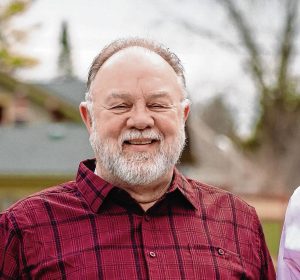Six people are vying for the Greenwood Common Council’s three at-large seats this fall.
Republican incumbents Mike Campbell, who has held one of the seats since 2012, and Erin Betron, who joined the council in February after being selected in a caucus, are asking voters to keep them in office. Joining them are Republican Steve Moan, a former school board member and current member of the city’s redevelopment commission; Libertarian James Sceniak, a former U.S. Senate candidate; and political newcomers and Democrats Rachel Matthews and Charrie Stambaugh.
For Betron, service has always been a part of her life, and running for city council is another way to continue serving others. Campbell decided to seek reelection because he wants to make Greenwood a better place to live, work and play, and being on the city council is one of the better ways to do that, he said.
Moan, a lifelong Greenwood resident, has the drive to help the community and wants to bring a “common sense” perspective to the council, he said. Sceinak, who relocated to the city a few years ago, believes local offices are where people can make the most change and says having several different voices on the council is a positive.
Stambaugh is passionate about the city she’s called home for most of her adult life, wants to bring a perspective that is lacking on the council and wants to be a voice for her neighbors so “their interests and concerns are heard and addressed.”
Matthews did not respond to multiple requests for an interview, so her answers are not available.
To help voters make their decision in the at-large city council race, the Daily Journal asked the candidates their takes on issues facing the city. This is Part 2 of the answers. Part 1 of the answers can be found here.
Here’s more of what they said, edited for length, clarity and grammar:
How should Greenwood approach growth?

Betron: (The city can keep its current pace of growth) only if we can have the resources to keep up with that, as far as public safety is concerned, and as far as the drivability of the roads and all the other things. It’s putting the cart before the horse. We’re bringing all these people, but we can’t sustain them and we can’t keep them safe. So, we need to put a hold on some of that while we fix up and fortify ourselves before we grow more. As far as some of the places that are already built, like as far as Old Town Greenwood — they’re trying to build up some of those storefronts and put nice shops and restaurants and stuff in there; that’s a great idea. But I don’t think growth should come in the form of more warehouse jobs. It shouldn’t be in the way of apartment complexes. It should be in something that’s going to bring in more income for us and not be a tax on our safety assets.
Campbell: Some concern has been brought up about the increase in growth and the increase in crime and the need for more police officers. … It’s a catch-22 because an increase in housing, an increase in business, is how you get money to fund more public safety. It’s the additional tax dollars that come in from the increase. … I don’t think we’re growing too fast, and interestingly people say, ‘Well, these people building apartments are just corporations wanting to make money.’ Well, of course, but they wouldn’t be investing the capital they’re investing if they did not think it was a good idea. They’re not going to make money if the development is not profitable or if people don’t move into it. We need to be careful about where we put growth, smart growth. … But the kinds of developments that we’re seeing are ones that are beneficial to the city, and in the long run will help us with our public safety issues.

Moan: As far as current growth goes, we must ensure balance because … our infrastructure is supporting a population from years past. Therefore, when we’re thinking about growth, and drawing people in with new apartments and townhomes like we’re seeing on Madison Avenue (in) the old middle school area; that is a great draw, especially when offering market-rate housing options with shopping and perhaps small restaurants. … We must be careful about population bursts and growth. … When we talk about future projects, about impacting the population of the city, we need to think through those things very carefully and use some common sense. Oftentimes we ask ourselves if we can and could and don’t ask ourselves if we should. That’s kind of common sense that I would like to bring to the council and ask the hard questions, and not necessarily just because I’m opposed, but you should look at it from multiple viewpoints.
Sceniak: I think we should welcome that. I think that we need to take the proper stepping stones to make sure that that growth happens in a safe manner and make sure that our communities aren’t broken up by that growth and making sure that we are doing everything we can say draw what I would call young professionals and those who are retired and went to have a successful life and the right side of it outside of Indianapolis. There’s a lot of features that really attract people, but I think you have to be cautionary with growth just for the fact that you have to do it in the right way so that your city can support it.

Stambaugh: Moving forward, we must grow sustainably and inclusively by embracing smart growth principles that promote economic sustainability with common-sense infrastructure while being able to afford to pay for the expenses of running a city. We can work with small business owners to ensure their patronage isn’t negatively affected by construction. We can better engage Marion County to identify ways to reduce traffic patterns near our county line areas to reduce congestion. As we accept proposals for new housing developments or business expansions, we can require analysis of roadway changes, school capacities and transportation access. As our city attracts new business, we need to continue work with ASPIRE to encourage a diverse economy with a mix of industries that bring well-paid jobs with options for mobility and continuing education. We have to consider quality of life alongside environmental stewardship to protect green spaces and promote cultural opportunities. We need more community engagement in the planning process like the city recently instituted through public forum and questionnaires. And finally, fire, police and emergency medical services must have the support they need to meet the demands of our still-growing city.
How do you feel about additional development of warehouses and logistics facilities?
Betron: As far as more just like $20 an hour warehouse jobs? No, how’s that going to help? We’ve got a lot of them already … why are they building new? Why don’t they just occupy some of those? That’s not the kind of growth that we need to see here. We need things that are going to help pay taxes, and that we could use to help increase this budget to cover public safety. Getting the roads taken care of, that’s a big part of it too. … Just looking at some of the forums, like Greenwood Chatter (a Facebook group) and some of the web pages for this city, there are a lot of residents who don’t want them in their backyard. They don’t want to look out their backyard which once had a farm field and see another warehouse being built that blocks their view of the sunrise in the morning.

Campbell: That is going to slow down quite a bit simply because all the big players are already out there. The most recent proposal that was postponed, that’s a manufacturing firm, which is different. People talk, they complain about the warehouses, but this is manufacturing, which has been a staple in Indiana for a long time. The last big approval we had was out on Allen Road, and I think we required it was at least a 10-foot buffer along it to separate the buildings from the houses across the street. But a lot of those houses over there were already built next to warehouses to the west of them. There are ways to do it, but no one ever wants it in their backyard. I like the idea of manufacturing coming into Greenwood, the jobs they provide, the wages they provide are good — but location is important. If that is approved for the location that they wanted, there’ll be some major concessions to separation between it and the surrounding neighborhoods. But we’ll have to see what they propose. I am in favor of continued industrial growth as long as it’s in the right location and the right kind of opportunity. I do know that not every proposal that comes before the city is even brought to the council. A lot of things are turned down because they aren’t the right kind of thing for our city. It’s just nobody ever hears about those.
Moan: Serving on the redevelopment commission has been a great experience where I have learned a great deal about the growth of warehouses and logistics facilities; many of which land in economic development areas falling into the purview of the RDC. Many of these developments provide employment for many in our community. Greenwood has a great central location that attracts these businesses. However, when they start as shell buildings, you must be aware of what kind of tenants they’re going to attract and what type of businesses will be operated. Typically, shell buildings are built to specs that target desired tenants. I would like to mention, too, that great companies like Endress+Hauser call Greenwood home. This is a great example of a company that gives back to our community through education, jobs, training and growth. In warehousing and logistics facilities, they tend to land near interstates, which we have close by. In any case, however, the thing I love about it is they’re choosing us, they’re choosing Greenwood.

Sceniak: I believe we can set up adequate areas and designate those for the warehouses, but I don’t see that as a potential issue in the future due to the fact that that (the city is) already monitoring what’s coming in. That will be a part of that making sure that wherever the warehouses go, they’re not a hindrance to the city and a hindrance to neighbors. When you look at anywhere where you’re setting up warehouses, you got to look at what neighborhoods they’re next to, what people they intersect, and that’s my first priority. … So if those warehouses are going to destroy neighborhoods, that’s one of the last things I want. So I’m hoping that as we see the future grow, so that warehouses will slow down. That’s what I’m predicting.
Stambaugh: We must hold businesses accountable for their promises to remain in alignment with our city’s priorities in order to receive incentives and continued abatements. While new warehouses contribute to our city’s growth in quantity, are we bringing enough diversity of income and higher-paying jobs with upward growth and incentives to stay in our city? Are we bringing in a mix of industries that allow for a family of four of five to afford quality housing and a strong quality of life on a single or even dual income? As a resident of District 3, where many of these new facilities have been built, I’ve worried whether our schools can handle a continued influx of new housing to accommodate this as well as the environmental impact on our green spaces and air quality. As a council member, I will encourage discussion on each of these facets as we consider proposals for new developments.
How should tax abatements be used by the city?
Betron: Originally tax abatements were made for blighted areas that nobody wants. The area that Endress+Hauser bought was an area that nobody wanted. Nobody wanted to build on that because it had those two waterways that went through it. …. I get it, that makes sense and they’re gonna bring high-paying jobs and take care of that land that nobody wants. … (Tax abatements are) a one-by-one thing, and it’s not a blanket yes or no. It is a one-by-one situation depending on what the area is (and) is it really blighted or is it necessary?
Campbell: We’re not writing these companies a check when we abate their taxes. We’re simply saying that we’re going to abate that so, for example, over a period of 10 years, you’re going to pay $6 million and not pay (another) $6 million. … They’re still paying us, and the difference is not ‘Are we going to get $6 million or $12 million?’ In my opinion, the difference is ‘Are you going to get $6 million or nothing,’ that if we don’t do the tax abatement, and Franklin says, ‘Yeah, we’ll give you a tax abatement.’ They’re going go to Franklin, or Whiteland. … Typically the council looks at three things: the capital investment, the number of jobs and the pay. Pay seems to be the one that weeds out a lot of people. We want them to at least have wages higher than the county average.
Moan: Abatements should be used for companies who offer value to our city. These organizations are shopping for communities in which to do business. They’re making a huge investment in the area by either moving, building, or leasing here, and so the incentive — it helps them make the decision. Without offering tax abatements or other incentives, organizations will simply move on to cities that do offer them. There is value in offering tax abatements, especially compared to future tax revenues. Economic development areas, tax increment financing, tax incentives, and the like can be complicated topics to understand. Basically, a tax abatement is trading unrealized tax revenue now of undeveloped land for future and ongoing tax revenues on developed property. Greenwood currently uses tax abatements for companies who offer value, meet wage/earning thresholds, and are identified as committed to Greenwood for the long term.
Sceniak: Tax abatements can bring growth and they can bring businesses and jobs. When I was talking with city officials, the abatements, they have a lot of criteria and I even saw one of the common council meetings where one lost their abatement because of employment. When I was discussing that with the public official, he was talking about the number of employees but also the fact that they’re high paying jobs. … I think they’re a net positive when they’re done correctly. So making sure that salaries are correct, drawing in the right jobs and that we can use that to help our community.
Stambaugh: Tax abatements can be a useful tool for Greenwood, but its use should be carefully considered and aligned with our city’s priorities. Cleary, we want to incentivize businesses to invest here, to create jobs and further stimulate our growth. But I’m more interested in better tying these abatements to job creation goals, pay scales, continuing education opportunities, and employee location sustainability. Are they going to pay well, keep their employees here and encourage internal promotions and education? As a council member, I will encourage in-depth vetting of all relief and abatement requests for existing and prospective businesses. Each request needs a strong cost-benefit analysis to determine if we will gain more in economic benefits than we will lose in tax revenue. I’ll prioritize transparency and accountability in monitoring performance and promises of businesses receiving these abatements. And finally, as a council member, I will seek input from residents to gauge their support and concerns regarding the use of tax abatements.
ABOUT THE JOB
What: Greenwood City Council At-Large
Term: Four years
Pay: $13,058 a year (2024)
Duties: Set annual spending for the city, make policy changes, adopt new local rules and ordinances, approve new taxes, appoint members to various city boards.
THE BETRON FILE
Name: Erin Maurine Betron
Party: Republican
Age: 46
Family: Two children
Occupation: Associate Director/Leadership Coach, Eli Lilly & Co.
Education: New Palestine High School; Walden University
Military service: U.S. Army/Army National Guard, 1997-2022
Political experience: Incumbent since February
Memberships: Impact Team Member, Emmanuel Church of Greenwood; Greenwood American Legion Post 252; Johnson County Women’s Republican Club; National Guard Association of Indiana
THE CAMPBELL FILE
Name: Mike Campbell
Party: Republican
Age: 70
Family: Wife, Maggie; two children
Occupation: Bus driver, Center Grove Community School Corporation
Education: Emmerich Manual High School, Indianapolis; Indiana Wesleyan University
Military service: None
Political experience: Incumbent since 2012
Memberships: NA
THE MOAN FILE
Name: Steven “Steve” F. Moan
Party: Republican
Age: 53
Family: Wife, Elizabeth; one child
Occupation: Accountant, Laurie & Dunbar CPAs
Education: Greenwood Community High School; Butler University
Military service: None
Political experience: Greenwood Community Corp. Board of Trustees from 2008-2020; Unsuccessfully ran for city council in 2019
Memberships: Redeemer Bible Church; Appointed member of the Greenwood Redevelopment Commission
THE SCENIAK FILE
Name: James M. Sceniak
Party: Libertarian
Age: 35
Family: N/A
Occupation: Behavioral therapist, Life Skills Autism Academy
Education: Pleastantwood Christian Academy (homeschooled), Goshen; Bethel College (University), Mishawaka
Political experience: Unsuccessfully ran for U.S. Senate in 2022
Memberships: Libertarian Party of Johnson County
THE STAMBAUGH FILE
Name: Charrie Stambaugh
Party: Democrat
Age: 40
Family: Husband, Jason; three children; three stepchildren
Occupation: Owner/Photographer/Graphic Designer, Photog Boss Babe LLC
Education: Southwood High School, Wabash; Purdue University School of Science, Indianapolis; Indiana University Indianapolis School of Medicine
Political experience: None
Memberships: Youth Cheer Director, Whiteland Warriors Youth Cheerleading





